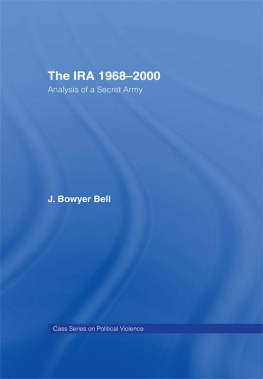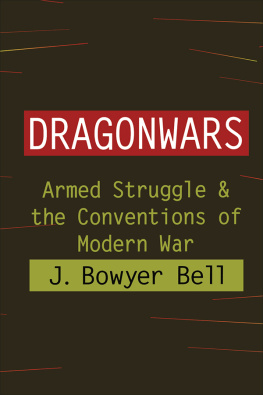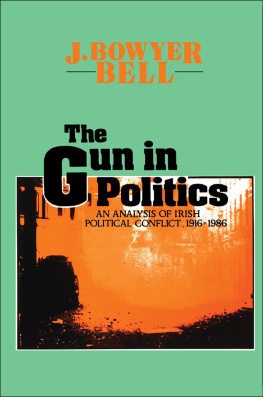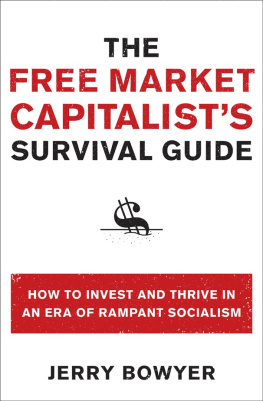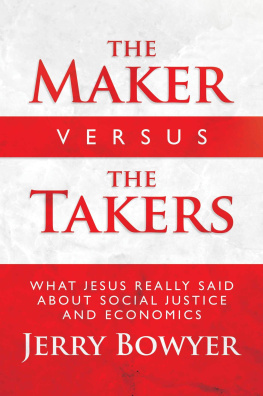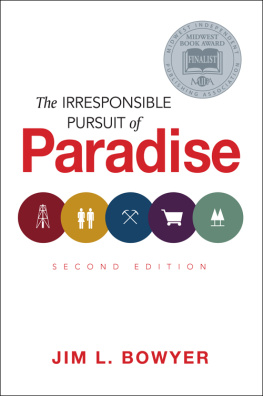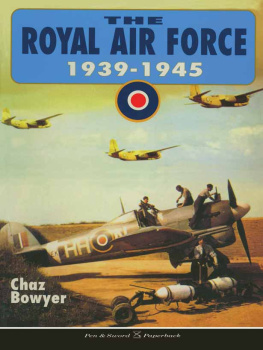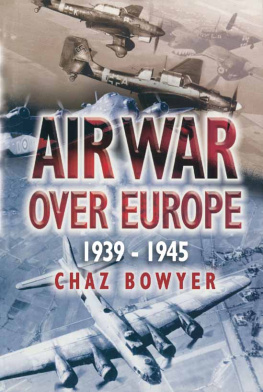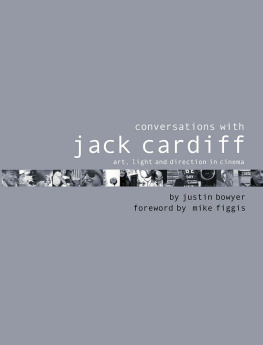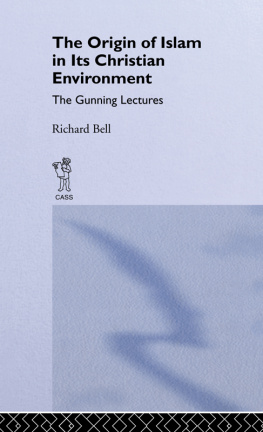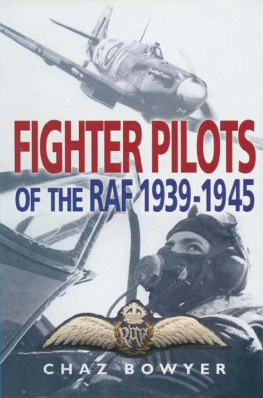Bell J. Bowyer - The IRA, 1968-2000
Here you can read online Bell J. Bowyer - The IRA, 1968-2000 full text of the book (entire story) in english for free. Download pdf and epub, get meaning, cover and reviews about this ebook. publisher: Taylor & Francis Group, genre: Politics. Description of the work, (preface) as well as reviews are available. Best literature library LitArk.com created for fans of good reading and offers a wide selection of genres:
Romance novel
Science fiction
Adventure
Detective
Science
History
Home and family
Prose
Art
Politics
Computer
Non-fiction
Religion
Business
Children
Humor
Choose a favorite category and find really read worthwhile books. Enjoy immersion in the world of imagination, feel the emotions of the characters or learn something new for yourself, make an fascinating discovery.
- Book:The IRA, 1968-2000
- Author:
- Publisher:Taylor & Francis Group
- Genre:
- Rating:3 / 5
- Favourites:Add to favourites
- Your mark:
- 60
- 1
- 2
- 3
- 4
- 5
The IRA, 1968-2000: summary, description and annotation
We offer to read an annotation, description, summary or preface (depends on what the author of the book "The IRA, 1968-2000" wrote himself). If you haven't found the necessary information about the book — write in the comments, we will try to find it.
The IRA, 1968-2000 — read online for free the complete book (whole text) full work
Below is the text of the book, divided by pages. System saving the place of the last page read, allows you to conveniently read the book "The IRA, 1968-2000" online for free, without having to search again every time where you left off. Put a bookmark, and you can go to the page where you finished reading at any time.
Font size:
Interval:
Bookmark:
ISSN 1365-0580
Series Editors: David C. Rapoport, University of California, Los Angeles
Paul Wilkinson, University of St Andrews, Scotland
Terror from the Extreme Right, edited by Tore Bjrgo
Millennialism and Violence, edited by Michael Barkun
Religious Radicalism in the Greater Middle East, edited by Bruce Maddy-Weitzman and Efraim Inbar
The Revival of Right-Wing Extremism in the Nineties, edited by Peter H. Merkl and Leonard Weinberg
Violence in Southern Africa, edited by William Gutteridge and J.E. Spence
Aviation Terrorism and Security, edited by Paul Wilkinson and Brian M. Jenkins
The IRA, 1968-2000: An Analysis of a Secret Army, J. Bowyer Bell
Analysis of a Secret Army
J. Bowyer Bell

First published in 2000 by
FRANK CASS PUBLISHERS
Reprinted 2004 by Frank Cass
2 Park Square, Milton Park, Abingdon, Oxon, OX14 4RN
Transferred to Digital Printing 2006
Frank Cass is an imprint of the Taylor & Francis Group
Copyright 2000 J. Bowyer Bell
British Library Cataloguing in Publication Data
Bell, J. Bowyer (John Bowyer), 1931
The IRA, 19682000: An analysis of a secret army. (Cass series on
political violence; 7)
1. Irish Republican Army History 2. Republicanism Ireland
History 20th century 3. Political violence Ireland
History 20th century
I. Title
322.4'2'09415'09045
ISBN 0-7146-5070-6 (cloth)
ISBN 0-7146-8119-9 (paper)
ISSN 1365-0580
Library of Congress Cataloging-in-Publication Data
Bell, J. Bowyer, 1931
The IRA, 19682000: An analysis of a secret army / J. Bowyer Bell.
p. cm. (Cass series on political violence, ISSN 1365-0580; 7)
Includes bibliographical references and index.
ISBN 0-7146-5070-6 (cloth: alk. paper) ISBN 0-7146-8119-9 (pbk: alk. paper)
1. IrelandHistory19222. Irish Republican ArmyHistory20th century. 3.
Political violenceIrelandHistory20th century. 4. Political violenceNorthern
IrelandHistory20th century. 5. Northern IrelandHistory. I. Title. II. Series.
DA963.B45 2000
941.5082dc21
00030340
All rights reserved. No part of this publication may be reproduced, stored in or introduced into a retrieval system or transmitted in any form or by any means, electronic, mechanical, photocopying, recording or otherwise, without the prior written permission of the publisher of this book.
Typeset by Vitaset, Paddock Wood, Kent
Publisher's Note
The publisher has gone to great lengths lo ensure the quality of this reprint but points out that some imperfections in the original may be apparent
T he editors of the Cass Series on Terrorism and Political Violence are delighted to have this opportunity to add J. Bowyer Bell's new book to our list. Everyone in the field knows Bell as exceptionally prolific. He has published more than 15 well-received, always intriguing, and often controversial books. Beyond this, there is a documentary film, innumerable articles and various short monographs. His books are normally studies of war, and the overwhelming number treat guerrilla and terrorist campaigns, but he has also written a fascinating volume on the art of cheating in war, magic, business, sports, etc.; and there is a second, equally interesting, book on how sports are played.
Bell's first study, his doctoral dissertation, treated the Spanish Civil War. Subsequently, he examined aspects of World War II, and that was followed in rapid succession by various efforts aimed it seemed at covering virtually the entire universe of armed conflicts in the twentieth century, or at least civil ones. No one in this generation has done better work on violent internal conflicts, and no one has produced more work on them either. He has studied most uprisings against colonial powers after World War II, insurrections and wars in Israel, the ANC struggle in South Africa, war in the Horn of Africa and struggles within Saudi Arabia. But most of all, he has been interested in the Irish struggles; indeed, he has devoted six good books to the topic, and Irish matters very often also play a large part in his more general analyses, such as The Myth of the Guerrilla and A Time of Terror: How Democratic Societies Respond to Revolutionary Violence.
To understand the internal workings of underground organizations, organizations which obviously cannot keep paper records, most of us find the memoirs of participants indispensable. Those who use memoirs in our courses also find that nothing turns students on more. Narratives incite interest and fix events and interpretations in our minds more firmly. Memoir literature is rich, extensive, and can be used for a variety of different academic purposes, for example, Begin, The Revolt; Grivas, Memoirs; Baumann, Terror or Love; Abu Iyad, My Home My Land; Mac Stiofin, Revolutionary in Ireland; McGuire, To Take Up Arms; Collins, Killing Rage. That extraordinarily useful film Battle of Algiers was based on Saadi's memoirs.
The problem with these valuable accounts is obvious. Whether written by defectors or those still committed, they intentionally or unintentionally obscure much truth for the sake of the message. But the fact remains that one must find out how participants understand the struggle, how their organization operates, and so there can be no substitute for talking with them.
Journalists favour this approach, political ethnography, much more than academics do; and, indeed, this volume is the only one in the series to rely exclusively on that method. Bell's sources are participants from the various sides of a particular conflict; and, since the primary concern of this analysis is the IRA, most of the contacts are Republicans. For nearly 40 years, Bell has been conversing with IRA and former IRA members, a process he calls osmosis. He has spoken with grandfathers, sons, and grandsons in the IRA, and calculates that he has spent more time writing about that organization than most volunteers have spent in it! This unique experience (can anyone match it?) gives him a rare perspective. Good political ethnography takes time, persistence, and reflection, because the informants, whether they are running or not, are desperately concerned to conceal details as well as reveal them. They are very difficult to decipher, and Bell emphasizes that he needs time and distance to do the job well. He must get out of the island to write about it. He begins always in New York, then goes to the scene, and finally returns to New York to think and write. Republicans may not always recognize themselves in his text, because their world is not mine, their world is shaped by a dream I do not share and so any analysis will for the faithful miss the point.
It is striking, too, that in recent years Bell's authority is such that he has chosen to dispense with footnotes. We who know his credibility continue to read him avidly, perhaps even more so than before. Academics have to be ambivalent about his self-confidence; our eyebrows are raised but our admiration is intense. For the sake of those unfamiliar with his subject, who want other views and more information, he has added a chapter reviewing and assessing what seems to be an endless supply of fresh publications. The Irish fascinate everybody interested in guerrilla and terrorist activity. Academics, politicians, soldiers, police, journalists, and students of all sorts will want to know more about the IRA, who by most accounts, are considered to be the inventors of the protracted national-liberation struggle. Certainly, no other underground element today has persisted for nearly as long. In the modern world, the overwhelming number of rebel groups, despite, or perhaps
Font size:
Interval:
Bookmark:
Similar books «The IRA, 1968-2000»
Look at similar books to The IRA, 1968-2000. We have selected literature similar in name and meaning in the hope of providing readers with more options to find new, interesting, not yet read works.
Discussion, reviews of the book The IRA, 1968-2000 and just readers' own opinions. Leave your comments, write what you think about the work, its meaning or the main characters. Specify what exactly you liked and what you didn't like, and why you think so.

